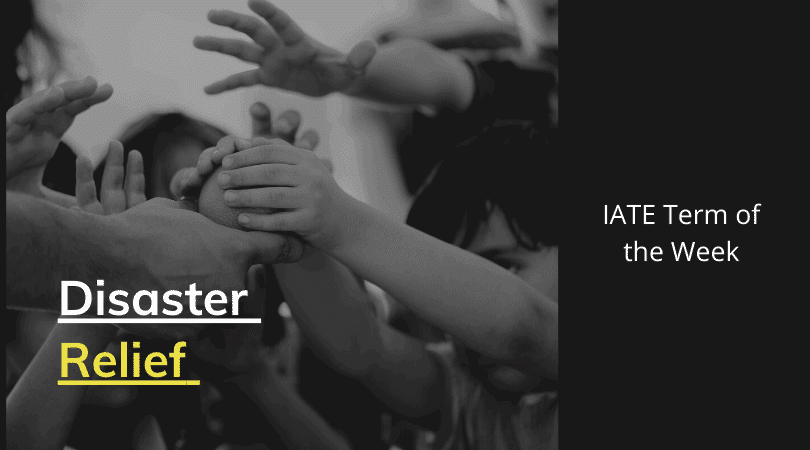In ancient times, a disaster was considered to be the result of an unfavorable position of the star(s), that is to say, the planet(s). People in ancient civilizations, like the Ancient Greek and Roman civilizations, believed that the unfavorable position of a planet could cause a calamity. This is why the prefix *dis- (meaning bad, pejorative) was used in combination with the word star (*astrum in Latin and *astron in Ancient Greek) to form the word *disastro. The initial Indo-European root *ster- led to the word *star-, which remains unchanged until today. There was the belief that *ster is the indicator of fate, fortune and destiny. This is why people in numerous ancient civilizations paid attention to the position of stars, ‘reading’ them as omens before births, wars or any kinds of important decisions. The badly positioned stars (*dis- and *ster) gave rise to the Italian word *disastro, which gradually led to the English one *disaster (1590s) and the French *désastre (1560s).
Disaster nowadays remains a word signifying a bad event in terms of the harm, damage and suffering it causes. Metaphorically speaking, the word disaster can be used to signify the concept of complete failure. For example, if a meeting does not fulfil its intentions, it is reasonable to say ‘the meeting was a complete disaster’. In the field of economics, disaster acquires an additional value, since it refers to damage related to financial loss. Either natural – in cases of floods, earthquakes, viruses, typhoοns, hurricanes – or technical – in cases of financial losses, communication failures, achievement gaps – disaster is a word with terrifying impact. It calls for immediate action and effective measures so as to eliminate its harmful effect.
Relief, on the other hand, is a word with exactly the opposite meaning of disaster. Relief is a word signifying the feeling of happiness that something unpleasant has not happened or has ended. Within this conceptual framework, relief is a noun used metaphorically to conceptualize any kind of ‘food, money or services that provide help for people in need’. Etymologically speaking, relief seems rooted in the meaning of alleviation. Its origins lie in the Latin word *relevare which means “raise again, alleviate”.
So, language here gives us an oxymoron1 in creating the phrase ‘disaster relief’ which opens space for finding the best policy in order to effectively deal with the impacts of any disaster. The phrase ‘disaster relief’ is categorized in linguistics as a primarily legal term which is used to define “the fast aid provided to alleviate the suffering of disasters”. Disaster relief usually includes humanitarian services, provision of transportation, medicine, accommodation, food, clothing, housing and shelter, and medical and technical services, which all ensure the fast repair of all damaged or compromised humanitarian services.
As a concept, disaster relief is identified as the immediately successful policy of eliminating the damaging results of any disaster. The factors giving birth to such a policy are official and governmental either on a national or international level, so that the policy has the authoritative power to be quick and widespread.
According to the International Disaster Center, there is a constantly updated list of International and National Disaster Relief organizations. Their aim is to provide Disaster relief services such as enabling communication systems, mobilizing resources, supplies and personnel quickly and establishing a harmonic cooperation among them. The Salvation army, The American Red Cross, UNICEF, and Team Rubicon, are some Disaster Relief organizations known worldwide.
Disasters are and will always be a potential danger of life whereas relief is and will always be a common desire of people throughout human history. It is high time we realized that no matter the explanatory approach to any arising disaster – misfortune, human error, impact of climate change, unpredictability, to name but a few – disaster relief ought to be a pro-active measure and policy explored by global society. Predictability can never turn to a fully controlled trait of human life, but being pro-active can be fully controlled and constantly improved.
Notes
- Oxymoron: a contradiction in terms , typically contained in a very short phrase or expression, such as: alone in a crowd, bitter sweet, controlled chaos, deafening silence, open secret, sweet sorrow, tough love, etc.
References
Online Cambridge Dictionary. 2020. Meaning of Disaster in English by Online Cambridge Dictionary [ONLINE] Available at: https:// dictionary.cambridge.org /dictionary/ english /disaster?q=DISASTER [Accessed 13 April 2020].
Online Cambridge Dictionary. 2020. Meaning of Relief in English by Online Cambridge Dictionary [ONLINE] Available at: https: //dictionary.cambridge.org /dictionary /english /relief?q=relief+ [Accessed 13 April 2020].
Online Etymology Dictionary. 2020. Disaster, Origin and meaning of the word Disaster by Online Etymology Dictionary. [ONLINE] Available at: https://www.etymonline.com/word/disaster [Accessed 13 April 2020].
Online Etymology Dictionary. 2020. Disaster, Origin and meaning of the word Relief by Online Etymology Dictionary. [ONLINE] Available at: https://www.etymonline.com/word/relief [Accessed 13 April 2020].
Online List of Disaster Relief Organizations.2020. Worldwide Disaster Center [ONLINE] Available at: http://www.disastercenter.com/agency.htm [Accessed 13 April 2020].
Online US Legal Definitions Dictionary, 2020. Disaster Relief, Law and Legal Definition [ONLINE] Available at: https://definitions.uslegal.com/d/disaster-relief/ [Accessed 13 April 2020].
 Written by Maria Papamargariti, Greek and English Philologist, writer in the field of children’s literature.
Written by Maria Papamargariti, Greek and English Philologist, writer in the field of children’s literature.


